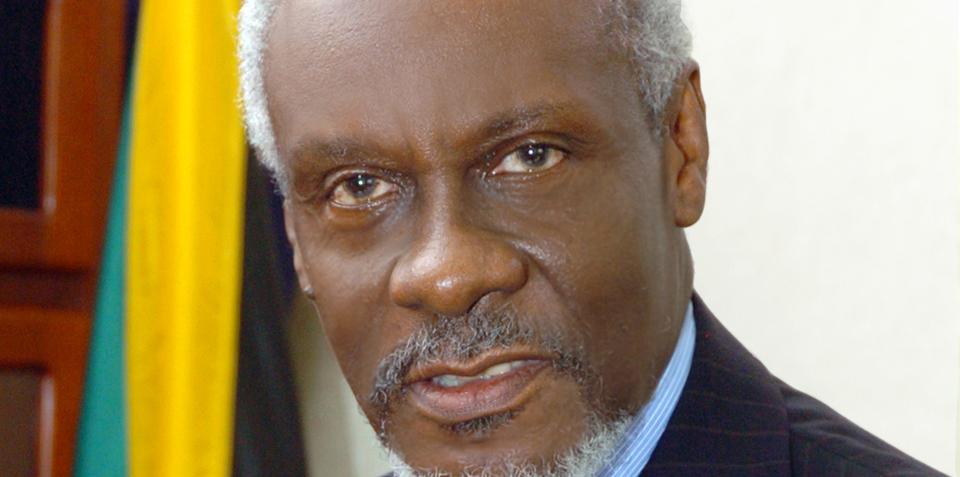
Professional and political experience:
Percival James Patterson was Prime Minister of Jamaica between 1992 and 2006. He served as Head of Government for 14 unbroken years before retiring from active politics in March 2006. At the international and regional level he has served as Chair of the Group of 15 developing nations (G-15), Group of 77 and China and the Caribbean Community (CARICOM). He is currently the Caribbean Community (CARICOM) representative on a Coordinating Committee comprised of international and Hemispheric Institutions and Donor Governments charged with the development of a strategic plan for the reconstruction of Haiti.
Mr. Patterson has played a lead role in various forums such as the United Nations, the Commonwealth of Nations, the Non-Aligned Movement and Socialist International. Jamaica was a member of the UN Security Council during his tenure as Prime Minister. He chaired the CARICOM Prime Ministerial Sub-Committee on External Negotiations since its inception and is credited for developing a unified negotiating position of CARICOM countries in the international arena.
He has played an integral role in guiding international deliberations to pursue peaceful resolution to disputes that threaten the credibility of these forums and to settle cross border conflicts between CARICOM countries.
He has extensive experience and acknowledged expertise in national, regional and international policy and political issues in a broad range of areas including international trade and negotiations which he has garnered in his more than three decades in government.
International Experience
He was chair of the ACP/EEC Ministerial Conference where he played a pivotal role in forging an agreement on the basic framework for the original Lome Convention which influenced the outcome of subsequent negotiations that led to the adoption of a comprehensive Convention which was signed in 1975. He has served as President and Spokesman of the ACP Ministerial Council on a number of occasions.
P.J. Patterson has contributed to numerous Conventions and Statements in the international arena including the Valletta Statement on Multilateral Trade and the Gozo Statement on Vulnerable Small States. These have helped to shape north-south relationship and influence the negotiating position of developing countries.
Regional contribution
At the regional level, he was instrumental in establishing the mechanisms that resulted in the evolution of the Caribbean Free Trade Area into CARICOM. Utilising his expertise in law and trade matters, he steered the Regional body toward the development of a Caribbean jurisprudence through the Caribbean Court of Justice and a borderless regional economy through the Caricom Single Market, both of which came to fruition in 2005 and 2006 respectively.
Mr Patterson is currently the Chairman of the Ramphal Commission, engaged in a study of Migration and Development in the Commonwealth.
National contribution
As the longest serving Prime Minister in Jamaica, he presided over the unprecedented modernization and transformation of the economic, social and political landscape of the country. His policies were guided by a National Industrial Policy that was developed to establish his Government’s key strategic long-term foci designed to achieve prosperity for the Jamaican people.
He ended the country’s 18-year borrowing relationship with the International Monetary Fund that set the stage for the country to experience the longest period of economic stability, marked by low interest rate, low inflation and a stable foreign exchange rate.
His policy of liberalization resulted in the expansion of the private sector into several areas of economic activities leading to greater access to goods and services at competitive prices. The liberalization of the Information Communication and Telecommunications Sector has positioned Jamaica as a gateway country in the Caribbean that possesses the infrastructure to transact business and facilitate economic activities in timeframes comparable to the developed world.
Mr. Patterson’s physical and social policies were designed to attract investments that would trigger economic activities throughout the country and across sectors. His administration attracted over $4.7 billion in foreign direct investment to the country. Access to decent shelter, water and electricity surpasses that of the Latin American and Caribbean Region.
In the emphasis on building human capital, the process of educational transformation encompassed improvements in early childhood education and the trebling of access to tertiary education.
As a result of his deliberate pro-poor policy, Jamaica has now surpassed the Millennium Development Goal of halving poverty, which declined by 70% from just under 44% in 1991 and over 14.8% in 2006.
Speeches and Lectures
Mr. Patterson has addressed world leaders in just about every international and regional forum including the United Nations, Group of 15, Group of 77, Non-Aligned Movement, Summit of the Americas, the OAS; Commonwealth of Nations and CARICOM. He has delivered numerous lectures on issues of international trade and negotiation, the development agenda for developing nations, regional integration at universities in Latin America and the Caribbean Region, Europe and North America.
Publications
There are six full-length published works on the life and policies of P. J. Patterson.
Family
Mr. Patterson has a son, a daughter and four grandchildren.

